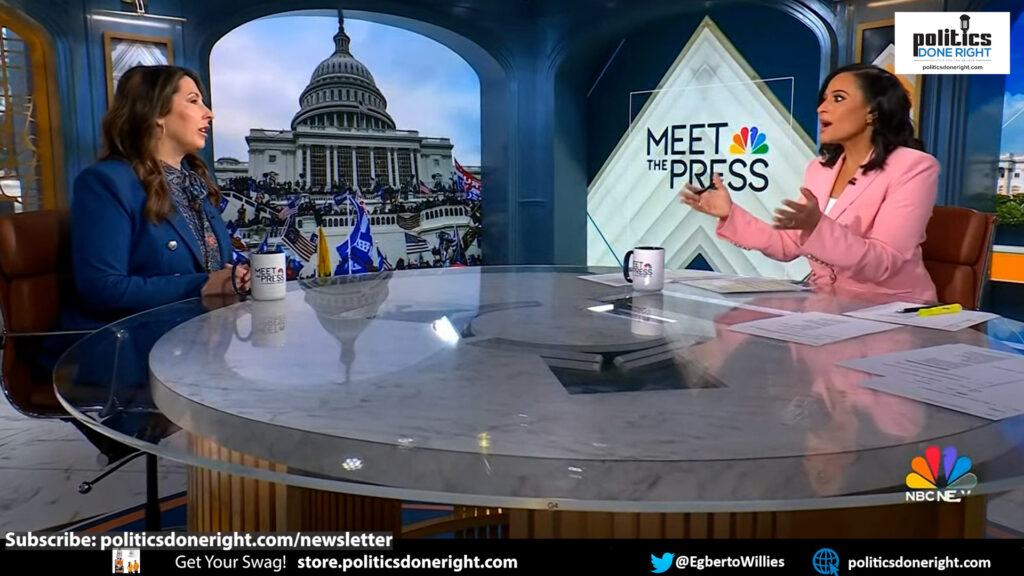Meet The Press’ host Kristen Welker was blindsided by NBC’s hire of the lying former RNC Chair Ronna McDaniel before she had this previously scheduled interview. Chuck Todd and the panel lit into the decision by NBC.
Kristen Welker corrects Fmr. RNC Chair Ronna McDaniel’s lies.
Podcasts (Video — Audio)
In a recent and stirring development within the realms of political commentary and news dissemination, Kristen Welker, a seasoned journalist for NBC News, found herself at the forefront of a critical journalistic endeavor. Welker’s interview with the former RNC Chair, Ronna McDaniel, now a paid contributor to NBC News, underscored a pivotal moment for journalism and political discourse in the United States. This confrontation illuminated the challenging dynamics between media integrity and political narratives, especially when former political figures transition into roles within mainstream media organizations.
The controversy at the heart of this encounter stemmed from NBC News’ decision to hire Ronna McDaniel, a figure intimately associated with the Trump administration and its contentious political strategies, as a news contributor. McDaniel, during her tenure as RNC Chair, was known for her unwavering support of Donald Trump’s presidency and the divisive policies and rhetoric that characterized it. Her transition into a media role raised eyebrows and sparked debate over the potential implications for journalistic objectivity and the blurring lines between political advocacy and news reporting.
Welker’s interview with McDaniel was not just a routine exchange of questions and answers but a manifest clash of journalistic duty against the backdrop of political partisanship. During the interview, Welker navigated through McDaniel’s assertions with a critical eye, challenging inaccuracies and confronting the narrative spun by the former RNC Chair. This encounter was not merely about correcting misstatements on specific issues, such as the events of January 6, border security, and crime rates, but represented a broader defense of truth in an era increasingly characterized by misinformation.
The dialogue between Welker and McDaniel touched upon several contentious points, including McDaniel’s stance on the January 6 Capitol riot, her views on border security, and the portrayal of crime rates in major cities. Welker’s fact-checking during the interview was a testament to the enduring role of journalists as guardians of truth, especially in conversations that have the potential to shape public opinion and political discourse. Her efforts to correct McDaniel’s claims in real-time demonstrated a commitment to factual accuracy and the journalistic mission to inform the public with integrity.
However, the presence of McDaniel on NBC News as a contributor, especially following her contentious interview with Welker, sparked a critical discussion about the responsibilities of news organizations in their hiring practices. The decision to bring a figure like McDaniel into a news contributor role raises questions about the balance between providing a platform for diverse viewpoints and the risk of legitimizing misinformation. It challenges news outlets to reflect on their role in safeguarding the informational ecosystem and ensuring that contributors uphold the standards of truth and factual reporting.
The aftermath of the interview and McDaniel’s hiring by NBC News underscores a broader tension within the media landscape. It highlights the ongoing struggle to navigate the complex interplay between political affiliations, media representation, and journalistic ethics. Welker’s confrontation with McDaniel was more than just a moment of journalistic accountability; it was a reflection of the broader challenges facing the media in an age where the lines between politics and journalism are increasingly blurred.
In conclusion, Kristen Welker’s assertive approach in correcting Ronna McDaniel’s misleading statements during their interview serves as a critical reminder of the vital role journalists play in upholding truth and integrity in public discourse. As former political figures like McDaniel transition into media roles, news organizations must rigorously assess the impact on their credibility and the trust of their audience. The pursuit of a balanced and truthful discourse is essential in maintaining the health of democracy, and journalists like Welker are at the forefront of this endeavor, challenging misinformation and advocating for a more informed public.
Viewers are encouraged to subscribe and join the conversation for more insightful commentary and to support progressive messages. Together, we can populate the internet with progressive messages that represent the true aspirations of most Americans.

